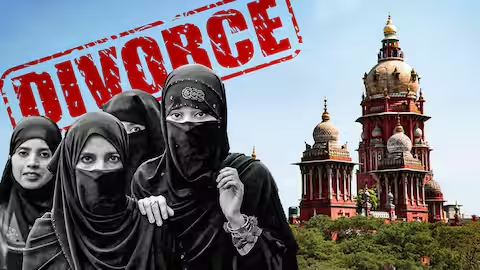Hyderabad– In a landmark ruling that upholds women’s autonomy under Muslim Personal Law, the Telangana High Court has declared that a Muslim woman’s right to seek Khula—a form of Islamic divorce—is absolute and does not require the husband’s consent or any specific justification. The ruling was delivered on June 25 by a Division Bench comprising Justice Moushumi Bhattacharya and Justice B.R. Madhusudhan Rao, as per a report by the India Today.
The case, titled Mohammed Arif Ali vs. Smt. Afsarunnisa and Another, stemmed from a dispute over a khulanama (divorce certificate) issued in 2020 by the Sada-e-Haq Sharai Council. The husband had challenged the validity of the council’s issuance of the khulanama, but both the family court and now the High Court rejected his claims.
The court held that once a Muslim woman initiates Khula by clearly expressing her intent to dissolve the marriage, the process is valid in the personal sphere, and the husband’s acceptance is neither a legal nor theological requirement.
Importantly, the court emphasized that religious institutions such as Muftis or Dar-ul-Qaza cannot unilaterally authorize or certify a Khula. Their role remains advisory. The High Court clarified, “A fatwa or khulanama issued by a Mufti is not binding in law,” and underscored that only a judicial court can validate the dissolution, making it legally enforceable.
The judges equated a woman’s right to Khula with a man’s right to Talaq, stating, “A wife’s right to Khula is parallel to a husband’s right to Talaq,” thereby reinforcing gender parity within the scope of Islamic divorce.
The court further differentiated Khula from Mubaraat, the latter being a mutual divorce agreed upon by both spouses. In contrast, Khula is a unilateral action initiated solely by the wife, and once declared, it is irrevocable.
The judgment also addressed concerns faced by many Muslim women who are left in limbo after initiating Khula through religious councils. The court called for greater clarity and cooperation from all stakeholders—including religious bodies and legal institutions—so that women are not left uncertain about their marital status.
Referring to verses 228 and 229 of Surah Al-Baqarah from the Holy Qur’an, the court noted that the religious text acknowledges a woman’s right to end a marriage by compensating the husband, with no requirement for his acceptance. The court interpreted this as a confirmation of the woman’s right to unilaterally seek Khula when the marital relationship becomes untenable.
The High Court also clarified the family court’s role in such matters: to verify the wife’s request for Khula, ensure a reconciliation attempt has been made, and confirm whether the woman is prepared to return the Mehar (dower), if applicable. This process, the court directed, should be summary and not become a full-fledged trial.
This judgment marks a crucial moment for Muslim women’s rights in India, offering legal recognition of their independent right to dissolve a marriage without being subject to patriarchal gatekeeping or religious ambiguity.




